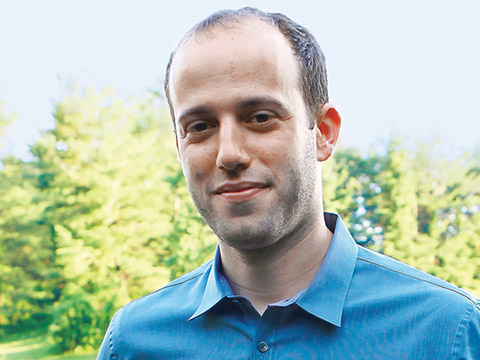In 2004, Benjamin Joffe-Walt and a photographer snuck into the Darfur region of western Sudan to meet with rebel soldiers in the desert to investigate claims of mass violence. He says it was one of the riskiest things he ever did during his eight years as a journalist, but it led to award-winning work on the Darfur genocide and ran in such newspapers as the U.K.’s Sunday Telegraph. These days, as one of the top executives at Change.org, Joffe-Walt’s pursuit of social justice is less dangerous, but no less passionate.
“If you’d told me 10 years ago that I’d be running HR at a company with offices in 18 countries, I would have laughed,” says Joffe-Walt (BEd 2003) of his job at the world’s largest petition platform. Despite this considerable career pivot, though, his underlying ambition is the same as when he was a journalist, and before that, a student activist: driving positive social change. “The most significant moral question for anyone with privilege is, ‘What are you going to do with it?’” he says. “A turning point for me was being introduced to ways of doing something positive with that privilege.”
While earning a bachelor of education at OISE, Joffe-Walt joined activist groups fighting racism and protesting the Iraq war. But over time he shifted to journalism as a vehicle to expose injustice. He worked for major media across Africa and the Middle East, reporting on human rights issues such as the struggles of Rwandan Hutu refugees.
When Joffe-Walt joined Change.org in 2010, it was a blogging platform where contributors wrote about social justice issues, and he was the human rights editor. Since then, he’s held several senior positions – including communications director, chief of staff and now “chief people officer” – as the organization evolved into an online petition site.
Anyone can start a Change.org petition, collect signatures and then try to engage decision-makers in meeting their demands. “Change.org has been successful because of the simplicity of our focus,” says Joffe-Walt. The site has more than 150 million users and claims more than 20,000 petitions have been victorious, including one by Nobel Peace Prize laureate Malala Yousafzai, who collected more than one million signatures in support of 12 years of education for girls in the world’s poorest countries.
Though he’s no longer trekking around the globe’s most dangerous places to document injustice, Joffe-Walt is confident that he’s still making a difference. To the critics of Change.org’s “clicktivism,” he says you shouldn’t measure the success of an activist or social-change organization by how perilous their work is. “Judge us by what’s been changed or accomplished in the world, not by how easy we’ve made it for people to participate.”
Recent Posts
U of T’s 197th Birthday Quiz
Test your knowledge of all things U of T in honour of the university’s 197th anniversary on March 15!
Are Cold Plunges Good for You?
Research suggests they are, in three ways
Work Has Changed. So Have the Qualities of Good Leadership
Rapid shifts in everything from technology to employee expectations are pressuring leaders to constantly adapt






